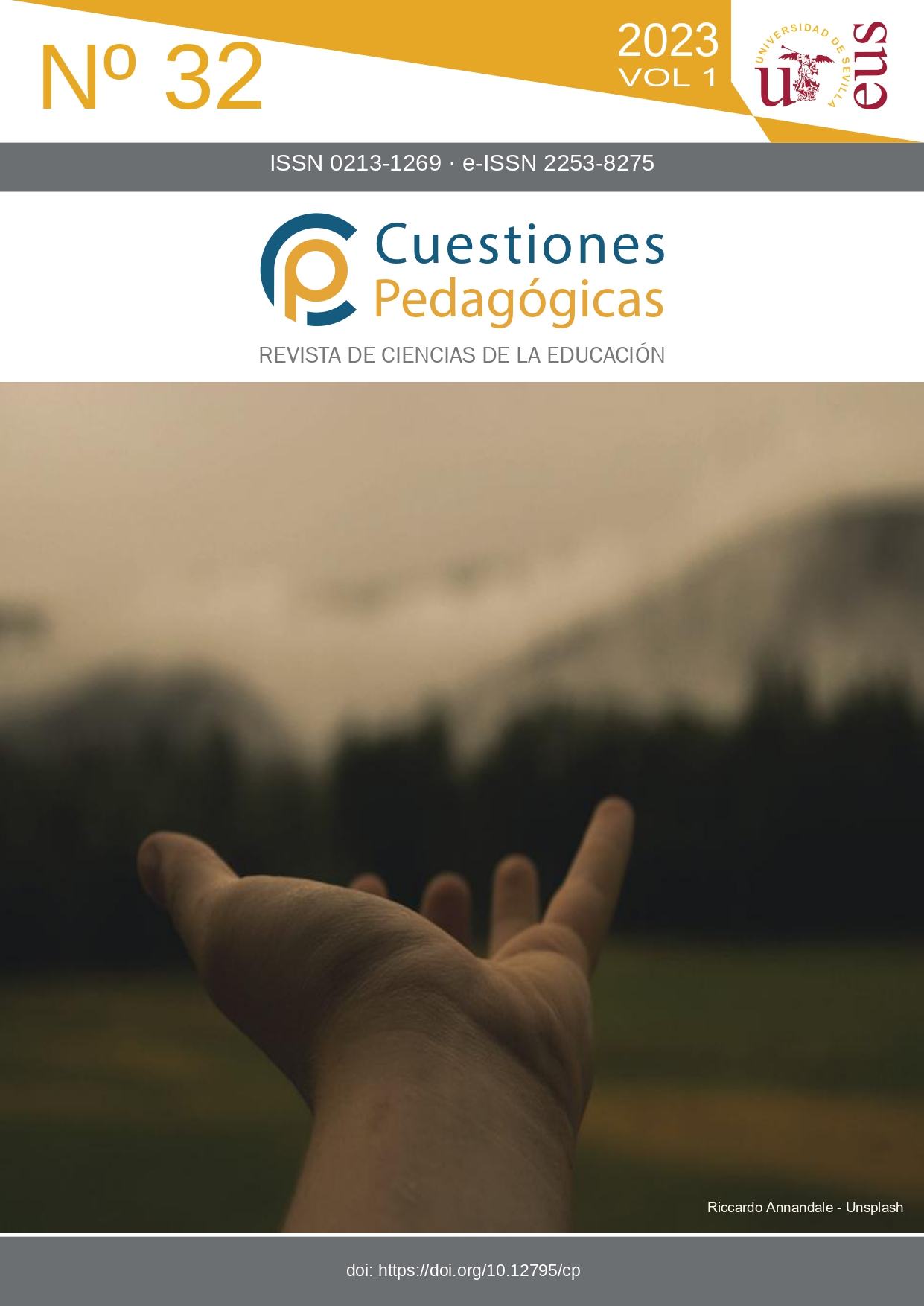Educación y sensibilidad: la educación de la sensibilidad tridimensional humana
DOI:
https://doi.org/10.12795/CP.2023.i32.v1.06Palabras clave:
Educación, Sensibilidad, apertura personal, Educación Sensible, Teoría de la EducaciónResumen
La tradición aristotélico-tomista ha reducido la noción de sensibilidad al conocimiento sensible y esto ha llevado a carencias en la educación de la sensibilidad humana. Aplicando una metodología fenomenológica hermenéutica, analizamos desde una perspectiva pedagógica las diferentes concepciones de la sensibilidad. La manifestación del ser humano en forma de triada ha sido defendida por autores de prestigio en diferentes culturas de todos los tiempos como la hebrea, la hindú, la griega, la latina, la budista, así como otras corrientes filosóficas impulsadas por Husserl y la fenomenología o Polo, máximo representante de la antropología transcendental. En este artículo se sientan las bases teóricas de la sensibilidad tridimensional humana: “corporal”, “mental” y “apertural”, así como la importancia de fomentar la Educación Sensible, necesaria para que la sensibilidad humana sea el punto de partida de un desarrollo personal auténtico y pleno de la propia originalidad. La falta de Educación Sensible puede dañar la vida de una persona puesto que cuanto mayor sea la sensibilidad de ésta, mayor será el daño. Finalmente, se aportan propuestas prácticas para desarrollar la Educación Sensible, llegando a la conclusión de que la sensibilidad humana es más amplia que la sensibilidad del resto de vivientes y es precisamente esa amplitud y libertad la que requiere de educación.
Descargas
Citas
Ales Bello, A. (2006a). Fenomenologia e ciências humanas: implicações éticas. Memorandum: Memória e História Em Psicologia, 11, 28-34.
Ales Bello, A. (2006b). The language of our living body. Analecta Husserliana, 89, 3.
Alvira, T. (1989). Enseñar a querer. Palabra. ISBN 84-7118-605-5
Bisquerra, R. (2009). Psicopedagogía de las emociones. Madrid: Síntesis
Baggini, J. (2002). René Descartes: Meditations on first philosophy (1641). In Philosophy: Key texts (pp. 35-60). London: Palgrave Macmillan UK.
Bauer, J. (2013). La violencia cotidiana y global: una reflexión sobre sus causas. Plataforma editorial.
Fernandes, M. L., & Massimi, M. (2021). Espiritualidade/religiosidade e psiquiatria em Eugenio Borgna. REVER: Revista de Estudos da Religião, 21(1), 155-170.
García Carpintero M.A ( 2019). Claret
González, Á. L. (2004). Pascal: la voluntad y el argumento de la apuesta. Servicio de Publicaciones de la Universidad de Navarra. ISBN: 84-8081-014-9
Kant, I. (1978). Crítica de la Razón Pura. Traducción de Pedro Rivas, Madrid, Editorial Alfaguara.
Kemp, S (1990). Medieval Psychology. Greenwood
Locke, J. (1975) An Essay concerning Human Understanding, Clarendon.
Loeffel, H. (2013). Blaise Pascal 1623–1662 (Vol. 2). Springer-Verlag.
Martínez-Domínguez, L. M. (2020). Una Pedagogía del Nosotros. FERSE. https://n9.cl/alxp9
Martínez-Domínguez, L.M. (2022) Educación Sensible: marco pedagógico y espíritu educativo. Almuzara Universidad.
Martínez-Domínguez, L.M. (2023) Asesoramiento personal basado en la Educación Sensible: acompañar en el desarrollo de la propia originalidad. FERSE. ISBN: 978-84-09-48127-9
Merleau-Ponty, M. (1976). Phénoménologie de la perception (1945). Libraqire Gallimard, Paris. ISBN: 9782070293377
Montessori, M. (1948/2013). Come educare il potenziale umano. Garzanti.
Mendaglio, S. (2011). Emotions and giftedness. On the social and emotional lives of gifted children, 58-61.
Mousavian, S. N., & Fink, J. L. (Eds.). (2020). The internal senses in the Aristotelian tradition. Cham et al.: Springer.
O’Callaghan, X. y Fernández González Ma. Begoña (2016). Compendio de Derecho Civil Tomo II: Derecho de obligaciones. Editorial Centro de Estudios Ramon Areces SA.
Pascal, B. (2018). Pensamientos. Estudio Preliminar, edición, traducción y notas de
Gabriel Albiac. Tecnos: Madrid.
Scribano, A. (2016). Sociología de las Emociones en Carlos Marx. Raleigh: Editorial A Contracorriente.
Sellés-Dauder, J. F. (2009). Intuición y perplejidad en la Antropología de Scheler, Universidad de Navarra.
Steneck, N. H. (1974) "Albert the Great on the Classification and Localization of the Internal Senses." Isis 65 (227): 193–211.
Shusterman, R. (2000). Pragmatist aesthetics: Living beauty, rethinking art. Rowman & Littlefield Publishers.
Spaemann, R. (1991). Felicidad y Benevolencia. Madrid: Rialp.
Simone, W. (2000). Echar raíces. Madrid: Trotta.
Tellkamp, Jörg Alejandro. Sinne, Gegenstände und Sensibilia: Zur Wahrnehmungslehre des Thomas von Aquin. Boston: Brill, 1999
Wolfson, Harry Austryn. "The Internal Senses in Latin, Arabic, and Hebrew Philosophic Texts." Harvard Theological Review 28 (2) (April 1935): 69–133.
Villar Ezcurra, A. (2021). La espiritualidad de Pascal. Los tres órdenes de realidad: cuerpo, espíritu, caridad. THÉMATA. Revista De Filosofía, (63), 132–153. https://n9.cl/57yox

Publicado
Cómo citar
Número
Sección
Licencia
Derechos de autor 2023 Cuestiones Pedagógicas. Revista de Ciencias de la Educación

Esta obra está bajo una licencia internacional Creative Commons Atribución-NoComercial 4.0.
Aquellos autores/as que tengan publicaciones con esta revista, aceptan los términos siguientes:
- Los autores/as conservarán sus derechos de autor y garantizarán a la revista el derecho de primera publicación de su obra, el cuál estará simultáneamente sujeto a la Licencia de reconocimiento de Creative Commons que permite a terceros compartir la obra siempre que se indique su autor y su primera publicación esta revista.
- Los autores/as podrán adoptar otros acuerdos de licencia no exclusiva de distribución de la versión de la obra publicada (p. ej.: depositarla en un archivo telemático institucional o publicarla en un volumen monográfico) siempre que se indique la publicación inicial en esta revista.
- Se permite y recomienda a los autores/as difundir su obra a través de Internet (p. ej.: en archivos telemáticos institucionales o en su página web) antes y durante el proceso de envío, lo cual puede producir intercambios interesantes y aumentar las citas de la obra publicada.



